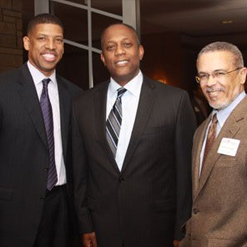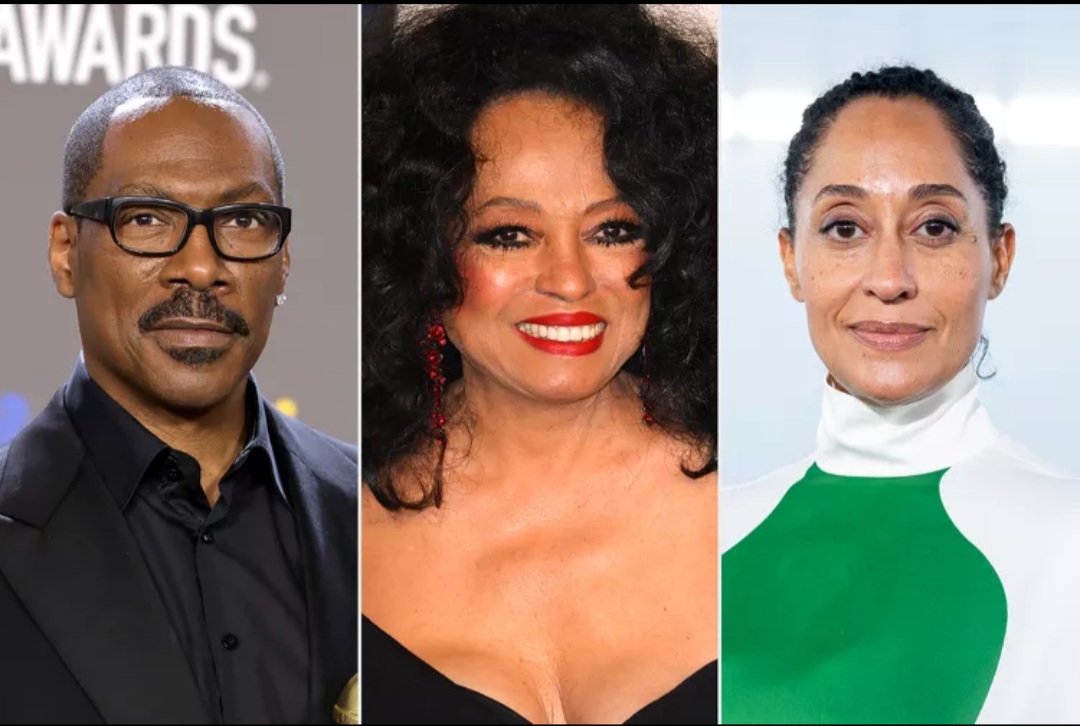

During the welcome reception, guests networked while enjoying wine, appetizers and a jazz band. Mistress of Ceremony Dr. La Donna White stated, “This is a beautiful site to see, we are all shapes and sizes. So I applaud each and every one of you, including myself for being here tonight. Please look through this beautiful program; it has a wealth of information. You have work to do, a call to action. There will also be a brainstorming session later, we want to do this next year and we want your feedback.”
Mayor Kevin Johnson pointed out there are disparities but we’re going to hear ideas and solutions. “Give us ideas as elected officials about what we can do. We’re always at the top of the charts for diabetes and hypertension, that needs to change. I want to thank Chet Hewitt for taking me under his wing. I wasn’t even supposed to be here. At 5 p.m. Chet emailed me and said “Oh yes you are; as always Chet I defer to you.”
Keynote speaker Dr. David Carlisle, Director of the Office of Statewide Health Planning and Development, spoke about the racial and ethnic disparities in Californian healthcare. African Americans have the lowest life expectancy throughout the country. 886,000 more African Americans died between 1991 and 2000 than would have died if equal healthcare had been available. We want to get this number to 0. There is evidence of racial/ethnic differences in cardiac care from 1989 to 2007, per an evaluation of 149 published studies. Asians, Blacks and Latinos overwhelmingly feel they’d receive better care if they were another race. This highlights the lack of trust in the health care system.
There is a huge gap between African Americans and other ethnicities. African Americans have the highest numbers of diabetes, hypertension and pediatric asthma. They also have the lowest bypass surgery rate, even though the angioplasty rate is going up there is still a huge disparity.
How to get to 0:
• Policy prioritization
• Universal health insurance
• Universal access (care geographically where we need it)
• Provider numbers; diversity. Major policy failing, no black or brown faces in colleges like UCLA
• Cultural/linguistic competency (providers need to connect with people they serve)
• Guidelines/standards/quality
• Engagement (we need to connect with our community so they are engaged and empowered)
• Existence of disparities is a travesty of the American health system.
We need to reach out to kids as early as elementary school, telling them you can be a doctor, dentist, or pharmacist to help defer attrition of kids we lose that enter college and actually finish. We have to mentor these children. The Office of Statewide Health Planning and Development (OSHPD) provides scholarships and loan repayment incentives, if graduates work in underserved communities.
A panel discussion followed with: Drs. Janine Bera, board certified internist, Kaiser Permanente Elk Grove; Monica Crooks, DDS, Dentistry; Dr. Kitty Hart, board certified family physician and healthcare and Dr. Frank Staggers, board certified retired urologist entertained questions from the audience. In the breakout session that followed, small groups were asked to answer the call to action and participate in a collaborative brainstorm and commitment strategy session, outlining ideas to immediately put into practice by collaboratively committing to projects, to help reduce health disparities in African American/Urban communities in Northern California
Dr. Janine Bera related, “So many things that plague our community start when we’re young, lack of proper diet, exercise, etc. Maybe I can’t help 1,000 people but I can try to help 100. To make a difference in some disparities, I try to make people see and understand. For example, asking patients, your pressure is a little high, your weight is a little over, what do you do for exercise? My call to action for everyone is to get one person to see what he or she can do.”
Monica Crooks, DDS stated “I educate my patients and ask that you educate the people in your lives about the urgency of proper oral hygiene. Bacteria in your mouth excrete toxins. Bacteria bathes tooth tissue in acid that erodes bone, this causes your to lose teeth. It’s not painful so people ignore the warning signs like spaces between teeth where there were none before or lose teeth. Diligent hygiene and regular exams is the way to combat this. 75% of Americans have some form of this disease. Women seek treatment 2 to 1 over men. Severe gum disease is 100% preventable but it is so prevalent.”
Dr. Kitty Hart said “I make sure I treat all patients the same and check myself when I feel low empathy for someone I’m treating. I remind myself frequently of Dr. Martin Luther King, Jr., who got educated and may have moved away but he came back to help his community. Where would we all be if he did not? I am willing to see patients at a reduced rate or pro bono. I have a membership plan for patients who otherwise would have no healthcare. The Sierra Health Foundation can create a partnership with hospitals or with the hospital’s nonprofit arm, where Sierra Health Foundation can provide assistance to them to provide written strategic plans to provide services to the underserved and turn in a scorecard regularly to Sierra Health Foundation so they can monitor the progress being made.”
Dr. Frank Staggers commented “I commend you for this forum and I love the term Black. I’m surprised, I didn’t know there were so many Black doctors in Sacramento. We must know what we’re talking about. There are health disparities, inequities in health care and disparities in the way care is delivered to these patients. My role is as a catalyst to initiate reaction vital for reaction but not to get used up within the reaction. What can we do to get this done? You’ve got to have allies. In the community MD doesn’t stand for ‘medical deity’. I subscribe to ‘CARE'”:
• Community, aware of problem and what you are trying to do
• Allies, health professionals you work with
• Research, you must do research to see where your resources are, you have to reach out, people won’t just come to you.
• Educate, your health care providers.
Chet Hewitt reminded all in attendance this is a call to action, so the search for zero can be achieved for the underserved 886,000 Dr. Carlisle spoke about. “I know you are doing things but we need to do things collectively”, Chet stated. The next meeting is going to be about moving forward. Evaluation forms are critical for feedback as we go forward with the Community Health Forum and Expo in Fall 2011 and for the next Black Physicians Forum on February 1, 2012.
The reactions to this event were positive as well as appreciative. For example, Dr. Bera’s reaction was she felt energy and enthusiasm, commenting: “Everyone in the room works hard at what they do every day and want to do all these great things but they get tired trying to do it alone. Today was that little nudge, re-energizing us and it’s fun and good food.”
The event closed with visits to exhibits, additional networking and the understanding by all in attendance the sense of urgency in getting the message out, so that the disparities plaguing African American health care can not only be addressed but also so that the health care gap can be closed.
Award certificates of appreciations were also presented to the extraordinary team of physicians and community advisory members who played a major role in partnership and development of the 2011 Black Physicians Forum which included:
• Monica Crooks, DDS ~ Dentist in Private Practice
• Karen Hart, MD ~ Board Certified Family Physician in Private Practice
• Darryl Hunter, MD ~ Radiation Oncologist at Kaiser Permanente
• Darin Latimore, MD ~ Director of Medical Student Diversity and Associate Program Director for the UC Davis Internal Medicine Residency Program
• Glenn A. Middleton, DDS ~ Dentist in Private Practice
• Terri Speed, DDS ~ Dentist in Private Practice
• Jammar Joseph Allen ~ Mass Mutual Financial Group
• William Jahmal Miller ~ National Communications Manager with Kaiser Permanente
• Valarie Scruggs ~ Health Equity Director for the American Heart Association
Sierra Health Foundation and Sac Cultural Hub Media Foundation whole-heartedly thanks the community partners who participated in and supported the first annual 2011 Black Physicians Forum: Mass Mutual Financial Group, UC Davis Health System, California Partnership Long-Term Care, SOL-Saving Our Legacy Project, and the American Heart Association.
See more photos and video coverage from the Black Physicians Forum on Sacculturalhub.com:
- View over 100 photos posted at http://www.sacculturalhub.com/2011-black-physician-forum
- View highlights from the Black Physicians Forum posted at www.youtube.com/watch?v=CofoUlEOPuk
You can also access and download the free resource of the Northern California Black Physicians Referral Directory included in the 2011 Black Physicians Forum event program booklet online.>>read more
For more information on how to get involved with the Black Physicians Forum, contact Strategic Marketing Director, Twlia Laster at (916) 662-3502 or e-mail twlia@sacculturalhub.com.
If you are a physician and would like to get added to the Northern California Black Physicians Referral Directory, e-mail our Administrative Secretary, Vicki Blakely at vicki@sacculturalhub.com or call (916) 475-2728.





